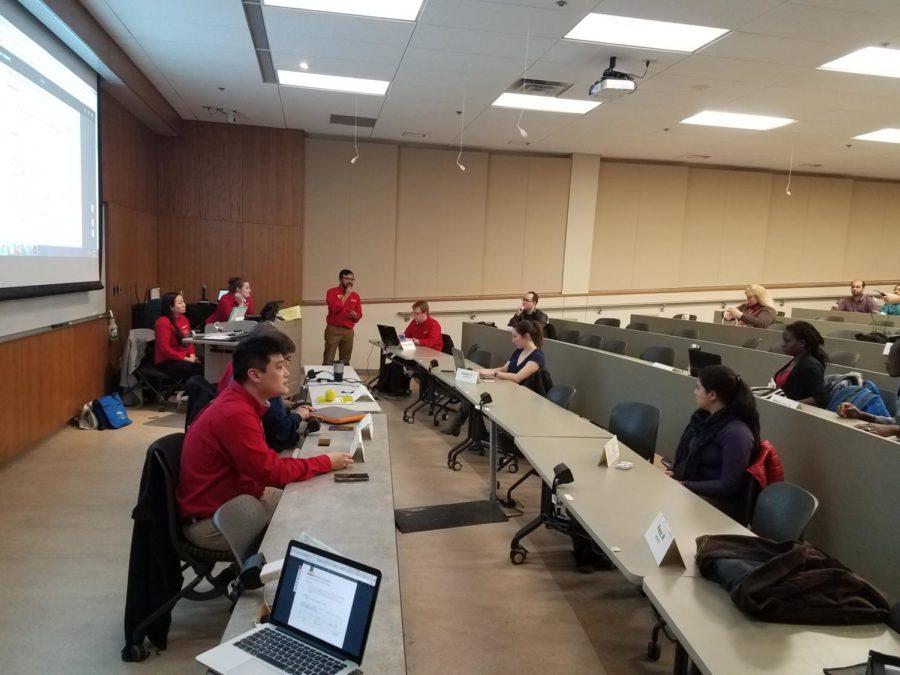GPSS discusses transition away from Blackboard, MU renovation
February 28, 2017
The Graduate and Professional Student Senate met Monday to discuss a potential transition away from Blackboard and a possible $65 million renovation plan for the Memorial Union.
Ann Marie VanDerZanden, director of Center for Excellence in Learning and Teaching (CELT), spoke during the open forum about her department’s updates on Iowa State University’s plans to either renew Blackboard or to opt to replace it with another learning management system (LMS).
The university’s license on Blackboard will expire in December 2017. If Iowa State decides to keep using Blackboard, it will become a cloud-based version called Blackboard Ultra, which VanDerZanden said “looks different and has a very different interface.”
“It may be called Blackboard, but it’s not going to be the same as Blackboard,” VanDerZanden said.
The other option would be to go with a different LMS. VanDerZanden said potential vendors will be on campus in late March to allow students and faculty to try out different programs.
Some LMS names brought up during her presentation included Desire to Learn and Canvas, the latter of which the University of Iowa will migrate to this summer. The University of Northern Iowa’s Blackboard will expire in September 2019. It is also currently reviewing its LMS options, according to the CELT website.
VanDerZanden said mobile accessibility, for both faculty and students, will be an important factor in choosing a new LMS. The Blackboard mobile app currently offers limited access to student users.
In regard to a question about costs to students, Mike Lohrbach, director of IT Services Systems and Operations Information Technology, said that their intent going forward is that costs “don’t necessarily increase but rather shift.”
“It’s not necessarily more expensive; it’s different expenses that we’re spending those funds on,” Lohrbach said. “So at this point, it’s our intention to not have to make any changes to how student fees are being used.”
VanDerZanden said that all classes starting in the spring 2018 semester will be taught with the new LMS.
Candidates for Student Government president and vice president also spoke during the open forum. Conner Tillo spoke on behalf of his and Rachael Barnes’ campaign for president and vice president, respectively.
Tillo, a political science major and Air Force ROTC cadet, said he and Barnes hope to make Student Government more transparent and accountable than it currently is.
“[Barnes] and I really want a system where we, as student leaders, are more accountable for our actions,” Tillo said.
Write-in candidates Anthony Chavez and Emeline Hanscel said they hope to better engage with Iowa State’s international student population and try to lower tuition.
After being met with skepticism from some senators, Chavez said he would attempt to lower tuition by better facilitating with state legislators.
“We’re trying to rebuild those relationships with the student body and the actual legislators that represent us as citizens of Iowa, and we think that we’ll be able to build a platform and build legislation that is going to help us decrease tuition, or at least stop it from rising,” Chavez said.
During his report as GPSS president, Vivek Lawana, who also serves as vice president of the Memorial Union Board, talked about a possible $65 million renovation plan for the Memorial Union.
Student fees would be raised to help cover the costs of renovating and adding to the Memorial Union, which first opened its doors 89 years ago.
Two phases of student-fee increases — $30 in fall 2018 and $42 in fall 2019 for a total of $72 — means Iowa State students would pay at least $99.50 in student fees until 2039.
Some senators wondered why some students should have to pay for renovations that they would never get to enjoy, but Lawana countered that the Memorial Union was first built with student contributions.
“Most of us will not be able to see the renovated MU as a student,” Lawana said, “but it’s going to be our legacy that we’ll see when we come back in seven years and we’ll say, ‘Yes, we voted for this.’”
After the reports of the Senate, GPSS senators passed a bill that increased professional advancement grants (PAGs) from $180 to $200, which will be facilitated by a $15,000 provision from the graduate college.
A bill was also passed confirming the GPSS budget for the 2018 fiscal year.
Meeting minutes and other information from the GPSS can be found on its website.
The next GPSS meeting will be on March 27.
















